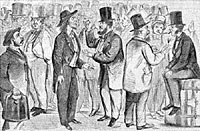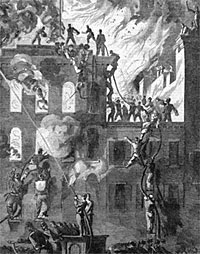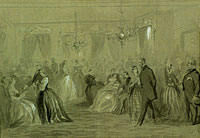Willard’s Hotel was the capital’s pre-eminent hotel, located close to the White House at the corner of E Street and 14th Street. Before the war, it had been frequented by both northerners and southerners. The Willard Brothers had expanded the hotel along 14th Street after they bought the hotel in 1847. The hall in which the Peace Conference met in February 1861 was formerly the F Street Presbyterian Church, which Willard’s had purchased in 1859. The result was a rambling, six-story building whose rooms varied widely in quality but functioned as the crossroads of Washington society and politics. According to Nathaniel Hawthorne, Willard’s was “much more justly called the center of Washington and the Union than either the Capitol, the White House or the State Department.”1
“The great employment of four-fifths of the people at Willard’s at present seems to be to hunt senators and congressmen through the lobbies. Every man is heavy with documents — those which he cannot carry in his pockets and hat, occupy his hands, or are thrust under his arms,” wrote William Howard Russell.2 British journalist Russell called it the site of “more scheming, plotting, planning heads…than any building of the same size ever held in the world.”3 John Hay, soon-to-be aide to President Lincoln, wrote on March 1, 1861:
“I am not sure that these excellent and intrepid artisans, with whom now and again I stop to exchange such observations as my aerial outlook suggest, cherish any hidden ambitions of the sort. Probably they do not. If one be bitten with the desire of legislative or other fame, Washington is a good place to disillusionise him. You see here, it may be, a reverend senator blind with a bad article of whisky; an eloquent representative, purpureal of nose and moist with the perspiration of yesterday. You shall see crowding the bars, shuffling along the aisles, populating the corridors of the blear caravanserai of hotels, at once represented every stage of official eminence and every grade of inebriety. There are generals, and colonels, and majors, and captains, governors, senators, honorables; all chew tobacco; all spit; a good many swear, and not a few make a merit of being able to keep two cocktails in the air at once. The hotel halls are littered with a mixture of dirt, scraps of paper, cigar stumps and discarded envelopes, and the whole is embroidered with an irregular arabesque of expectoration. Exceedingly small and very dirty boys take a good deal of trouble and make an unnecessary amount of noise in the endeavor to induce you to purchase the Star and States for five cents. Heavy persons, whom you have never seen before, with moist hands, eyes luminous with intoxicating beverages, break through the crowd and wildly shake your hand. They convict you of having met them before somewhere. You say you have been there, whereupon you are instantly saddled with an acquaintance who grasps your hand fifty times a day, and whom you heartily wish at the – antipodes.”4
President-elect Lincoln went directly to Willard’s on his arrival in Washington on February 23, 1861. He stayed in a suite on the second floor looking out toward the White House on the west. He was met at the hotel by New York Senator William H. Seward. The President’s secretary, John Nicolay, noted in a letter to his finance: “For the present we are quartered at Willard’s Hotel. The original program was to go to a private house which had been rented for the purpose. This plan having been changed, and no rooms having been reserved, all the party except Mr. Lincoln have but sorry accommodations. Well, next week we hope to be in the White House where perhaps it may be better.”5
Lincoln’s slippers had been left behind in his luggage when he departed suddenly for Washington. Ernest B. Furgurson wrote in Freedom Rising: Washington in the Civil War, “This set off Willard’s first test as host to the incoming president. His own slippers would not do for Lincoln; Abe’s feet were too big. Nor could Willard think of any guest whose slippers might fit. Then he remembered that his wife’s grandfather, seventy-eight-year-old former congressman William Czar Bradley, who was visiting at Willard’s house across the street, had ‘a good large foot.’ The old man was delighted to have the honor of lending his slippers to a Republican he greatly admired, and so Lincoln wore them for days, perhaps weeks, before returning them with a note of appreciation.”6
At the Willard’s Hotel in Parlor 6, the president-elect met future Cabinet members, potential office-seekers and representatives of the Peace Commission then meeting at the hotel. The suite was given up by New York businessman William E. Dodge, a commission delegate. “It is for you, sir, to say whether the whole nation shall be plunged into bankruptcy, whether the grass shall grow in the streets of our commercial cities,” Dodge told the President. “If it depends on me, the grass will not grow anywhere but in the fields and the meadows,” said the President-elect. At this point, Dodge and the President disagreed with Dodge urging him to yield to the South and Lincoln asserting his duty to “preserve, protect and defend the Constitution…It must be respected, obeyed, enforced and defended, let the grass grow where it may.”7
On the day of his arrival, Mr. Lincoln was greeted by the Washington Board of Aldermen here. A few days later on February 28, Mr. Lincoln appeared at a window to respond to a “serenade” by Washington residents: “I hope that if things shall go along as prosperously as I believe we all desire they may, I may have it in my power to remove something of this misunderstanding–(cries of ‘Good,’ ‘Good,’ and loud applause)–that I may be enabled to convince you, and the people of your section of the country, that we regard you as in all things being our equals in all things entitled to the same respect and to the same treatment that we claim for ourselves — (cries of ‘Good,’ and applause)–that we are in no wise disposed, if it were in our power, to oppress you or deprive you of any of your rights under the constitution of the United States or even narrowly to split hairs with you in regard to these rights. (Loud and prolonged cheering.) But [we] are determined to give you, so far as lies in our hands, all your rights under the constitution, not grudgingly, but fully and fairly. (Cries of ‘Good,’ and applause.) I hope that by thus dealing with you we will become better acquainted and be better friends. (Cries of ‘Good,’ and applause.)”8
Starting on February 4, delegations from 11 states had gathered for meetings in the hotel’s ballroom called Willard’s Hall. The Peace Commission was chaired by former President John Tyler. According to Nicolay, there was “a great crowd there, and so many ladies in the parlor as to make it seem like having a party every night.”9 When one Southerner on the Peace Commission told the President: “Everything now depends upon you,” Lincoln replied: “I cannot agree to that. My course is as plain as a turnpike road. It is marked out by the Constitution. I am in no doubt which way to go. Suppose now we all stop discussing and try the experiment of obedience to the Constitution and the laws. Don’t you think it would work?’10
On the night before the Inauguration, businessman Ezra Cornell wrote a letter to his aunt in which he described conditions at the hotel:
Mr. Willard told me today that he had 1,500 guests booked. I asked him how many rooms he had in the house. He answered, about five hundred. Thus you see he averages three to a room, which is just the number I have in my room – a gent. from Jamestown, N.Y., one from Fort Wayne, Ind., and myself.
The halls and parlors are radiant nightly with ladies, many stopping at the house, and others who come in from the neighborhood to spend the evening, to see, be seen, promenade, dance, etc.
Besides the large number stopping at this house, hundreds are attracted from the other hotels, and private houses, hoping to get a look at Mr. Lincoln, and occasionally they succeed in their wishes, but it increases the jamb to an intolerable degree, and renders it unpleasant.
Last evening about 10 p.m. Mrs. Lincoln held a short levee in the parlor, which gave some hundreds the opportunity to be introduced and shake hands with her. She is a short, plump body of a woman, apparently from forty to forty-five fresh health look, and plain becoming attire. I like her appearance much better than I did Miss [Harriet] Lane, Mr. Buchanan’s niece, whose Old Maidship has presided at the White House the past four years.
About 11 p.m. Mr. Lincoln came in from spending the evening abroad, and stopped a few minutes in the parlor receiving the introduction of those present, and exchanging a pleasant word with each. This was the first time I had seen him since he left New York, and the first opportunity to shake hands with him. He looks much as the pictures represent him, and I was favorably impressed with his appearance.11
The bill for his pre-inaugural stay came to $773.75. That stay ended when outgoing President James Buchanan picked up Mr. Lincoln on the way to the inauguration on March 4, 1861. After the ceremonies, the President & his family went directly to the White House.
Chase family chronicler Peg A. Lamphier wrote: “During the early months of 1861, hotel proprietors kept the peace by arranging for southerners to stay on one floor and use the Fourteenth Street entrance, while northerners entered on the Pennsylvania Avenue side of the building.”12 When war broke out, according to Kentuckian Cassius M. Clay, “Willard’s was full of guests, from top to bottom, most of them Southerners.” Clay took upon himself to organize a battalion of loyal Washingtonians and used the Willard as his headquarters. He mustered them in the hotel’s auditorium. “This recruiting went on several days, till we had about as many men as the old theater could hold.” Meanwhile, Clay spread his own rumor “that it was possible the next day martial law would be declared and some of the rebels then in Willard’s hotel shot.” According to Clay, “several hundred men” emptied out of the hotel.13 During the post-Fort Sumter crisis of April- May 1861, the Clay Battalion under the irascible Clay was based here. Adam Gurowski noted that the company never had occasion to fight but would have fought well since “Most of them [were] officeseekers.”14 After the First Battle of Bull Run in July 1861, poet Walt Whitman complained that Willard’s “is full of shoulder-straps – thick crush’d creeping with shoulder-straps. (I see them, and must have a word with them. There you are shoulder-straps! – but where are your companies? Where are your men?)”15
Willard’s continued as a center for political and social life throughout the Civil War. Journalists George Alfred Townsend wrote: “A dining hour at Willard’s was often wondrously adapted for a historic picture when accoutred officers, and their beautiful wives – or otherwise – sat at the table d’hote, and sumptuous dishes flitted here and there, while corks popped like so many Chinese crackers, and champagne bubbled up like blood. At night the Provost Guard enacted the farce of coming by deputations to each public bar, which was at once closed, but reopened five minutes afterward. Congress water was in great demand for weak heads of mornings, and many a young lad, girt up for war, wasted his strength in dissipation here, so that he was worthless afield, and perhaps died in the hospital.”16
Not everyone loved the chaotic ambience of Willard’s. New York attorney George Templeton Strong hated the Willard’s Hotel, where he frequently stayed on trips to Washington for the U.S. Sanitary Commission. On January 16, 1864, he wrote in his diary: “Willard’s absolutely worse than ever; crowded, dirty, and insufferable. Agnew and I were put into one room in an obscure corner of the top story, accessible only by an enterprising and difficult escalade. It had the advantage of being traversed by certain steam pipes, connected with a large iron tank in the garret. They leaked and gave us the benefit of an atmosphere warmed by escaping steam and flavored with oleaginous vapors; also of a persistent noise, ‘as of a hidden brook in the leafy month of June,’ and somewhat as of frying sausages likewise. Dinner next day abominable, especially in point of attendance. Waiters a crowd of ‘What-is-it’-s or perhaps refugee field hands, incapable of being enlisted even as teamsters, cooks or military bootblacks.”17
Lincoln’s secretaries often ate here; the Willard’s large dining room boasted better food than other Washington hotels. Presidential aide William Stoddard described it as “a great place to go to. Drop in there whenever you can, especially in the evening. More news; more great men from all over the country; more generals, of all sorts; and, if you can go up into the parlors without being ushered out as a trespasser, you will find more pleasant ladies there, and more of a strangely mingled society than you can anywhere else in Washington. There is always a stream of people coming and going between Willard’s and the White House.”18 In 1862, writer Nathaniel Hawthorne observed of the hotel’s guests: “You are mixed up with up with office-seekers, wire-pullers, inventors, artists, poets, prosers (including editors, army correspondents, attaches of foreign journals, and long-winded talkers), clerks, diplomatists, mail contractors, railway directors, until your own identity is lost among them.”19
General Ulysses Grant and his son Fred checked in Willard’s on March 8, 1863. The travel-weary and unprepossessing union officer was not recognized on signing in and was assigned to an undesirable room on the top floor before the clerk read signature. Grant simply did not look like the highest-ranking officer in the Union Army. His appearance in the Willard’s dining room caused a stir — especially after Congressman James Moorhead announced: “Ladies and gentlemen: The hero of Donelson, of Vicksburg, and of Chattanooga is among us. I propose the health of Lieutenant-General Grant.”20 A chant of “Grant! Grant! Grant!” was soon taking up by the diners, who rushed to his table to congratulate him. When it became evident that a peaceful dinner was out of the question, the general and his son retired to their room. “Not long after this a political person came to Grant’s door – former Secretary of War Cameron, as Fred remember it; Congressman James K. Moorhead of Pennsylvania, by reporter Brooks’s account – and he bustled Grant off to the White House,” wrote historian Bruce Catton.21
Noah Brooks reported what then happened: “The past few days of suspense and intense anxiety have been succeeded by a relief of substantial good news; our most ardent hopes have been realized by the good tidings from the front of battle, and yesterday and last night the excitement over the glorious news was unparalleled, even in Washington. On every street corner and public place hundreds of men were gathered in knots, discussing or inquiring about the military situation, and last evening the entire city was ablaze with joy upon learning that Grant had pressed the rebels past their old battle ground of the Wilderness, and was driving them before him toward Richmond. About nine o’clock in the evening, the excitement of the populace having risen to a fever heat, an impromptu procession was formed in front of Willard’s and preceded by a band of music the crowd marched up to the White House, where a fine serenade was given the President, and he appeared at the door, stepping out among the sovereigns who were crowded around the entrance. Order being restored, he proceeded to thank the assemblage for the compliment, which he thought would not have been bestowed if they were not anxious to hear from his own lips the confirmation of the good news which was in circulation on the street.”22
Footnotes
- Nathaniel Hawthorne, “Chiefly About War Matters, by a Peaceable Man” ,em>Atlantic Monthly 10, no. 57, July 1862.
- Fletcher Pratt, editor, William Howard Russell, My Diary North and South, p. 31.
- Pratt, My Diary North and South, p. 424.
- Michael Burlingame, editor, Lincoln’s Journalist: John Hay’s Anonymous Writings for the Press, 1860-1864, pp. 49-50.
- Helen Nicolay, Lincoln’s Secretary, pp. 70-71.
- Ernest B. Furgurson, Freedom Rising: Washington in the Civil War, p. 45.
- Frank van der Linden, Lincoln: The Road to War, p. 205.
- Roy P. Basler, editor, Collected Works of Abraham Lincoln, IV, p. 247.
- Helen Nicolay, Lincoln’s Secretary, p. 75.
- Ida Tarbell, Life of Lincoln, p. 423.
- Harry E. Pratt, Concerning Mr. Lincoln, pp. 67-68.
- Peg A. Lamphier, Kate Chase & William Sprague: Politics and Gender in a Civil War Marriage, p. 46.
- Cassius M. Clay, The Life of Cassius Marcellus Clay: Memoirs, Writings and Speeches, pp. 260-262.
- Adam Gurowski, Diary from Adam Gurowski, 1861-1863, p. 24
- Walt Whitman, Two Rivulets, p. 61.
- Mary Cable, The Avenue of Presidents, p. 125.
- George Alfred Townsend, Rustics in Rebellion, p. 190.
- George Templeton Strong, Diary of the Civil War, p. 393.
- Michael Burlingame, editor, Inside the White House in War Times, p. 30.
- Allan Nevins, The War for the Union: The Improvised War, 1861-1862, Volume I, p. 188. (From Nathaniel Hawthorne, ‘Chiefly About War Matters,” Atlantic, July 1862, pp. 43-61.)
- Bruce Catton, Grant Takes Command, pp. 124-125.
- Michael Burlingame, editor, Lincoln Observed: Civil War Dispatches of Noah Brooks, pp. 107-08.
Visit
John Hay
John Nicolay
Ulysses S. Grant
Ambrose E. Burnside
The Willard Hotel











